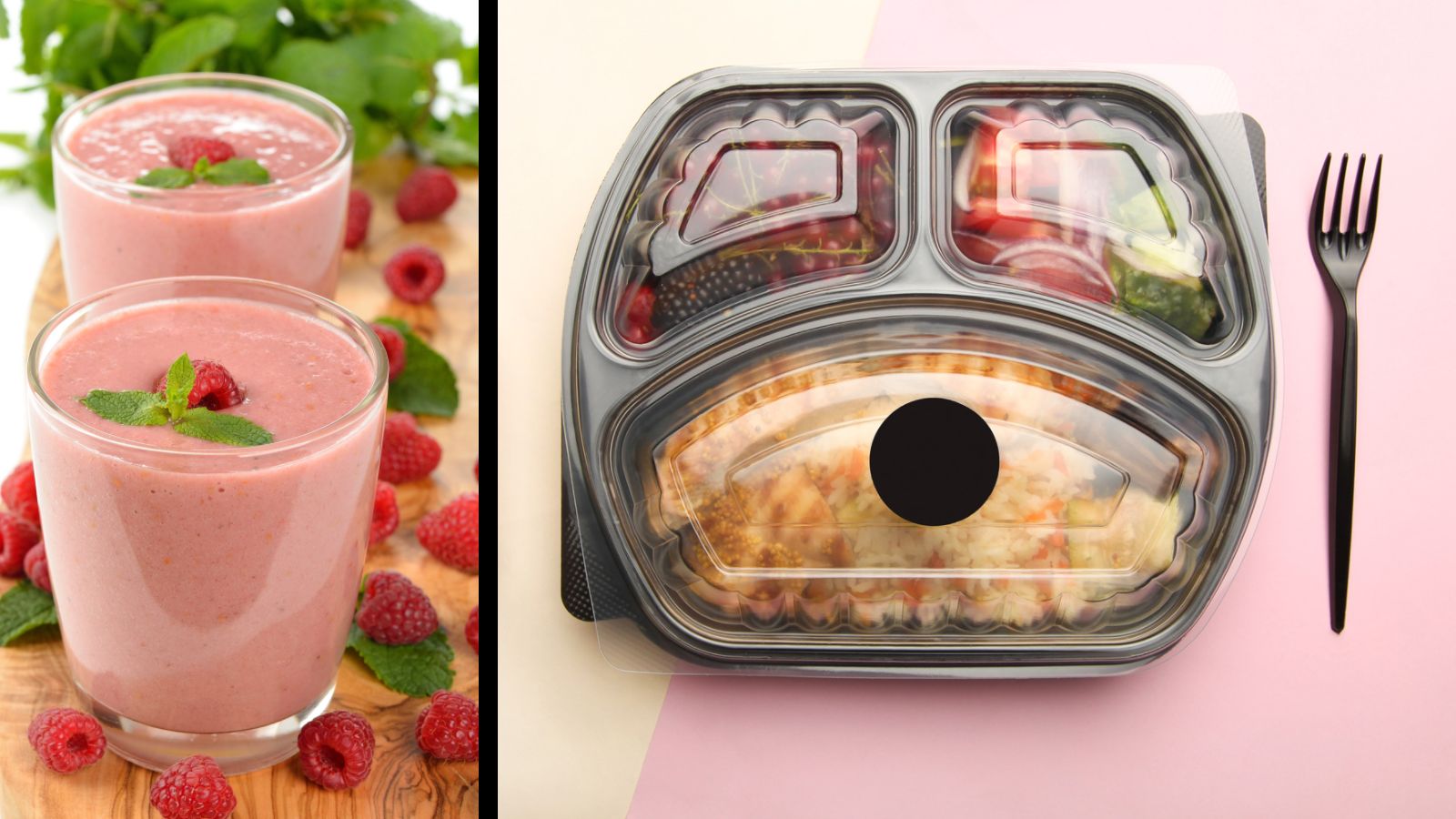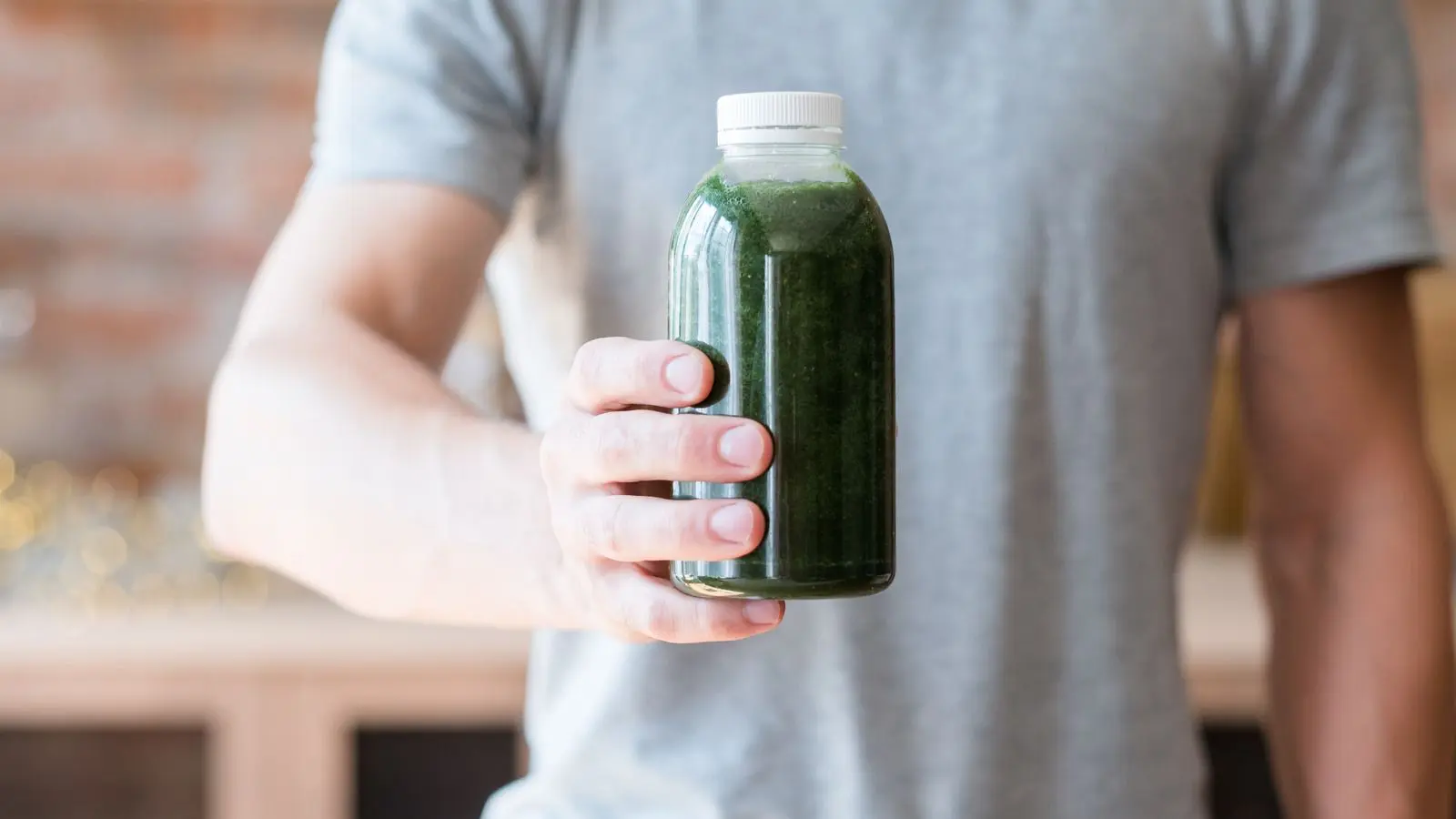
The best online fitness resource you'll ever need. We filter out the BS to ensure you meet your health and fitness goals!

The best online fitness resource you'll ever need. We filter out the BS to ensure you meet your health and fitness goals!

Whenever someone is on a bulk or trying to put weight on, some of the advice they will receive is to ‘drink’ their calories. As in, add some high-calorie shakes to their days to help them hit their calories. It’s an incredibly useful piece of advice when time and calorie goals can be inconvenient. But what about weight loss? If smoothies can help with weight gain, then can 2 smoothies a day and 1 meal be a convenient way to take in all the necessary nutrients and calories someone needs to lose weight?

Well, let’s talk about that.
It’s important to discuss upfront exactly how a diet like this works. Understanding the scientific method behind body fat reduction will help to inform your decision should you be looking to attempt a smoothie diet. Also, it should help you to understand when reading about new diets exactly how they work and what you are NOT being told.
Smoothie diets have appeared in many different forms. They are advertised as fast and efficient routes to weight loss. But they typically keep you at arms-length from the actual method to success. That being a calorie deficit.
Body fat is simply stored energy. The preferred unit we use to describe energy is a ‘calorie’. You may already be familiar with the energy balance equation. That being Calories In/Calories Out. If we were to eat every single day to our body’s ‘maintenance’ calories, we would maintain the same weight every single day. Whenever we take part in an activity, we ‘burn’ calories. Our body burns calories at rest, too. But the total expenditure each day would vary depending on our rate of activity.
If we spent all day in front of the TV, our body would burn fewer calories. Because it would only need to use energy to keep us alive and metabolize our food. If we went on a 5k lunchtime run we would burn more. And the total caloric expenditure would increase.
If we were to eat more calories than we burnt on either of these days our body would choose to store those extra calories in adipose tissue on our body. Otherwise known as body fat. The more we eat and the less we move the more body fat we carry.
If we wanted to lose weight, we would need to either eat less food, burn more energy or ideally combine a mix of both methods. This is called creating a calorie deficit.
The average adult male requires a daily intake of 2500 calories. The average adult female needs less than 2000 calories a day. Theoretically, in order to lose body fat, these two adults would need to create a calorie deficit by eating less or moving more.
The most convenient way to do this is to ensure they eat less. The adult male could eat 2000 calories a day, the female 1500. Both would likely lose body fat.
So, what does this have to do with the 2 smoothies a day and 1 meal diet? Well, it’s another in a long line of overly restrictive diets that aims to create a calorie deficit without necessarily saying that’s what it’s doing. The deficit is instead packaged into an appealing, fun-looking, convenient diet.
One of the many purported benefits of a meal replacement diet, or 2 smoothies and one meal a day diet, is the rapid weight loss without sacrificing any of the necessary nutrients that your body needs to function.
It is possible to make your own smoothies. However, most of the diets require you to follow a specific regimen and have the smoothie recipes or packages sent to your door. With everything pre-packaged and measured out it helps you to stay on track and removes any and all guesswork you might otherwise encounter attempting to make your own smoothies at home.
Most meal replacement diets ensure that the smoothies themselves are made from fruits and vegetables or a suitable replacement or supplementation. A high concentration of these on a regular basis can help the dieter to consume the recommended amount of fruits and vegetables needed to maintain a healthy lifestyle. Some even contain high concentrations of protein, a macronutrient that can often be under-consumed by the general population. High protein, high fruit, and vegetable, smoothies can help you to stay satiated which is particularly beneficial when you’re attempting to lose weight.
Whilst all of this sounds promising and incredibly convenient, limiting yourself to 2 smoothies and 1 meal per day could result in a fiber deficiency. During the smoothie blending process, most of the fiber in fruits and vegetables can be pulverized and ultimately lost. Meaning that by the time your smoothie sachets reach you they are devoid of most of their fiber.
Fibre has many important roles within the body. It supports your gut and microbiome health. Disturbing this can lead to irregular bowel movements, constipation, blood sugar fluctuations, and a rise in cholesterol levels. High cholesterol itself can lead to heart problems or even strokes. The lack of fiber can be supplemented without affecting the requirements of a smoothie diet. However, it’s always recommended to meet your fiber and nutrient goals with whole foods instead of supplements so you can benefit from all the other micronutrients that come with whole foods.
Premade smoothies and smoothie packages can also be high in sugar. Some store-bought or subscription-based programs have been observed to have as much as 53 grams of sugar per smoothie. It’s always best to check the nutritional labels of any smoothies or smoothie packages to ensure you’re consuming a balanced amount of nutrients.

As mentioned previously, body fat is simply stored calories.
To lose body fat you need to create a calorie deficit. A pound of fat has been observed to be around 3500 calories. If someone wished to lose one pound of fat a week they could create a calorie deficit of around 500 calories per day. When they consistently live to this deficit they would see their weight drop at a consistent one pound per week.
If someone wished to see faster weight loss they could increase that deficit further. And at times under medical supervision, this is recommended.
As mentioned previously the average adult male should eat about 2500 calories per day. If this man is overweight he could eat at 2000 calories to see the one pound per week loss. They could even eat at 1500 calories per day, a 1000 calorie deficit, to see faster weight loss without much concern.
However, nutrition is entirely prescriptive. A 500 calorie a day deficit is likely the most that the average person could manage. When people tend to restrict more than this they can come across adherence issues, nutritional deficiencies, and even muscle loss. The latter may not be of concern to the average person. But the average gym-goer may see this as a non-negotiable.
Meal replacements can be anywhere from 200 to 800 calories each. The smoothie diet prescribed smoothies are typically lower. If one were only consuming 2 smoothies and one meal a day that could have the dieter eating anything from 1000 to 1500 calories per day depending on the size of the one meal that they were consuming.
Very low-calorie diets are often only prescribed under medical supervision. These are typically reserved for patients who are clinically obese and have struggled to lose weight in the past. They are often short-term and if continued long-term can result in many risks such as the patient feeling incredibly hungry, experiencing constipation or diarrhea, dizziness, headaches, or even thinning hair over time.
Women who menstruate and attempt long-term low-calorie diets can find that they lose their menstrual cycle.
However, one of the biggest independent risk factors for type-2 diabetes is being in the obese BMI category. Considerable body fat gain can impair the body’s sensitivity to insulin. Insulin is an important hormone. It’s responsible for several processes within the body. But one of the main ones is reducing your blood sugar levels. An inability to control blood sugar is what leads to type-2 diabetes and all the associated health problems that come with that. A rapid reduction in body fat, specifically around the pancreas where insulin is produced, has been observed to reduce the symptoms of type-2 diabetes and even cause it to go into remission for some patients.
However, whilst this is seen as a positive of a very low-calorie diet, this has also been observed in patients following less restrictive diets. Which should always be attempted in the first instance.
Another oft-purported benefit of attempting a smoothie diet is the belief that it helps your body to ‘detox’. These diets are often marketed after the holidays like Christmas or any time of the year when excessive drinking tends to occur. A detox diet apparently helps to flush out any harmful toxins from the body, leaving it ‘cleansed’. They tend to be accompanied by periods of fasting.
It’s important to note that if you have a functioning liver and or kidneys then any detox diet won’t help your body to detox you any more than it already is. The main function of these organs is to eliminate harmful toxins. Smoothies won’t boost this any further. Nor are there any diets that can help your liver and kidneys to perform any better than they already do. If you were to have particularly underactive liver or kidneys then it is recommended that you seek medical attention instead of attempting a new diet.
The purported benefits tend to be experienced through regular activity, removing unhealthy foods from your diet, and losing additional body fat. Mental clarity, another ‘benefit’ of detoxing, tends to be experienced through periods of intermittent fasting.
Weight loss is a complex and prescriptive process. Meal replacements can be beneficial especially for people who lead busy lives. However, it’s important to remember that you need to ensure you are meeting your daily recommended intake for macro and micronutrients. Nutrient deficiency can lead to further problems down the line if left unchecked.
Whilst you are allowed 2 smoothies and one meal a day. Even if you are receiving your smoothies pre-made for you it’s important to ensure that your one meal a day is balanced. These meals should contain the right amount of proteins, carbs, and fats as well as additional fruits and vegetables.
Further to this, it’s important to remember to stay hydrated. If you are drinking your calories it doesn’t mean that you should rely on smoothies for hydration. Mild dehydration can lead to fatigue, cramps, and even seizures. Have a few glasses of water on top of the smoothies you are drinking every day.
Some people have also observed that smoothie diets don’t leave them as satiated as they originally hoped. If you find this is the case for you then you may wish to consider alternative diets.

There are many roads that lead to Rome. 2 smoothies and one meal a day can certainly aid with rapid weight loss, much like other restrictive diets. They all work off the basis of the calorie deficit. However, this diet in particular takes much of the guesswork out of the hands of the dieter. This also helps them to maintain regular weight loss whilst also ensuring they receive as many nutrients as possible.
It can be a great benefit to those who struggle with meal prep. However, it can lead to multiple nutrient deficiencies. This may well put the dieter in too big of a deficit than may be sustainable.
There doesn’t appear to be much support when coming out of the diet. So it may be worth looking into alternative diets that help maintain the new weight.